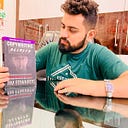5 Best Psychology Books To Understand Human Behavior …
5 books that will help you understand human behavior
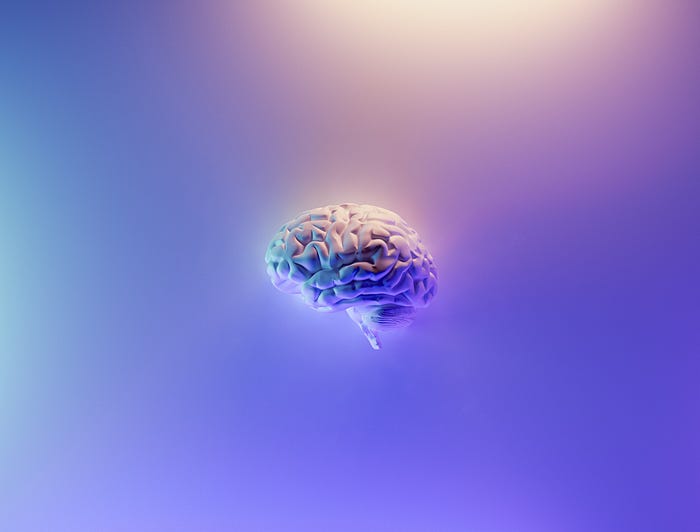
We are all cut from the same cloth, and we all share the same tendencies. The sooner we realize this the greater our power to overcome negative tendencies within us. Understanding human behavior brings us closer to ourselves and helps us embrace both the good and the bad.
Bringing out this ideal self within us is what we really want where we are embracing our flaws and progressing towards a better self. By becoming more self-aware we humans feel truly fulfilled. Here in this article, I’ll be recommending five books to understand human behavior.
1. The Laws Of Human Nature By Robert Greene
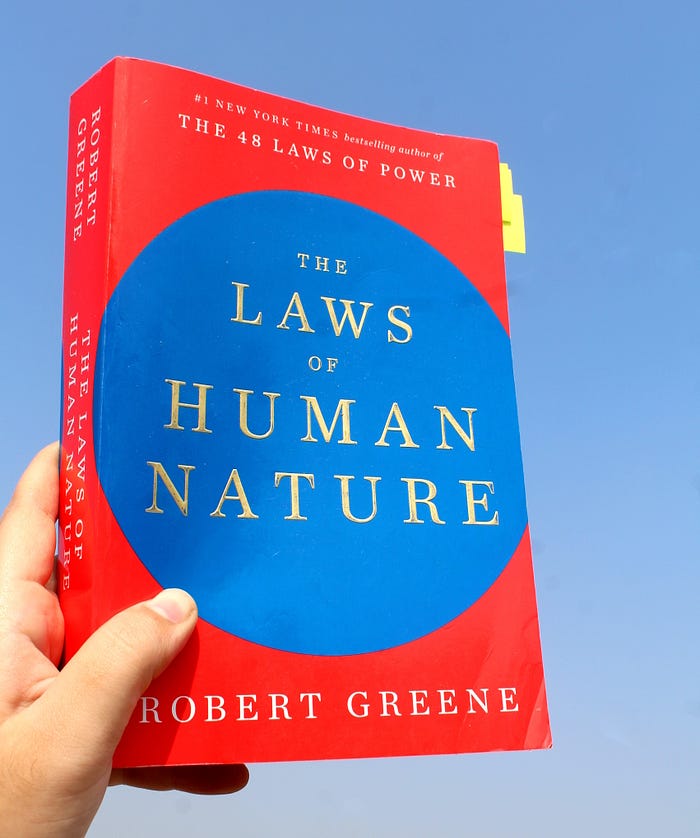
Introduction:
It’s a kind of codebook for deciphering people’s behavior, the full gamut. Each chapter deals with a particular aspect or law of human nature and has a story of some iconic individual(s) who illustrate the law positively or negatively.
It also includes strategies and ideas on dealing with yourself and others under the influence of that particular law. It suggests ways to transform this basic human force into something more positive and productive to no longer be the slaves of our inherent nature.
Key Insights:
- Accept People As They Are
Everyone is different and if we continuously get upset and frustrated when people are not following our advice we’ll soon become mentally unstable. - Play A Role
Actually, most people aren’t happy with themselves — what they do and how they feel. That’s when role-playing comes to the rescue. Act as if you already have what you want. Soon you’ll become that person — a better version of yourself. - Don’t Constantly Wait For Something Better
Running after the latest trends won’t lead to anything productive.
Life will get boring at some point, whether we like it or not. It’s best to focus on strengthening your relationship with the people around you rather than seeking to create other shallow ones. - Resist the Downward Pull of the Group
You should retain your independence and rationality regardless of what others tell you. You should develop self-awareness and concentrate on the present moment every time you’re in a group.
Final Thoughts:
The book emphasizes the importance of observing and interpreting body language, facial expressions, and other nonverbal signals.
Developing the ability to read these cues can help you better understand the emotions, intentions, and underlying feelings of other people. One of the best books you’ll ever read on human nature.
2. Thinking Fast And Slow by Daniel Kahneman
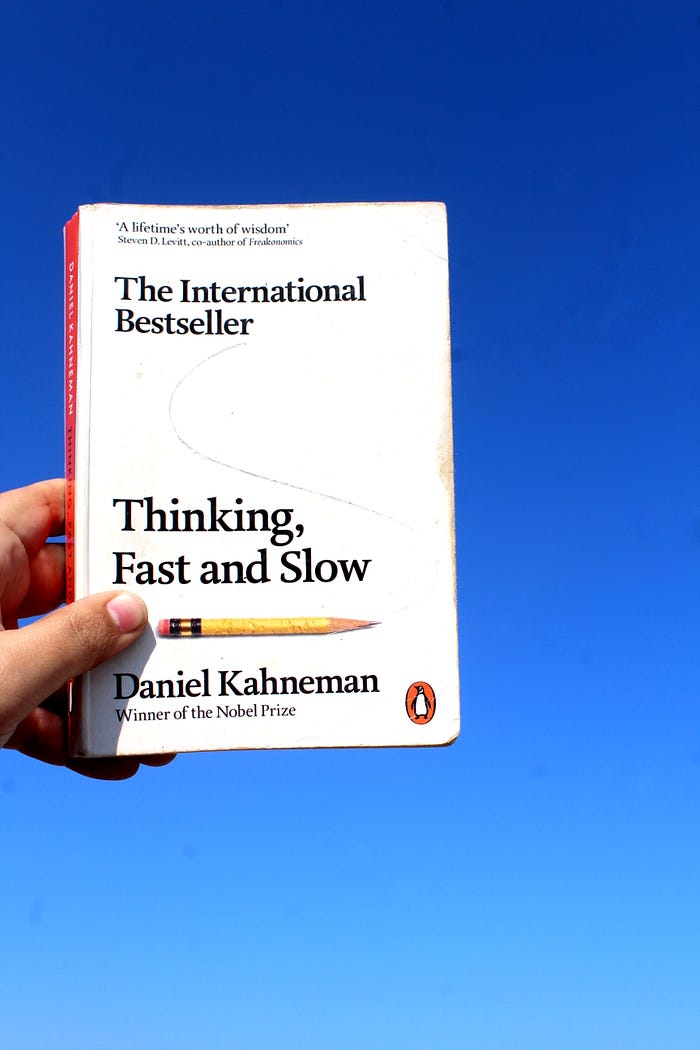
Introduction:
This book is a result of 40 years of work by psychologist Daniel Kahneman & he has managed to deliver a brilliant, fascinating, & at times intimidating account of human judgment & decision making
The central argument of the book is that the human brain has two systems
System 1: It’s the brain’s automatic, intuitive, & unconscious thinking mode. It requires little energy or attention but it is often biased prone. It guides our day-to-day decisions. So if you are solving the equation of 2+2 your system 1 is at work.
System 2: It is a slow, controlled, & analytical method of thinking where reasons dominate. System 2 allocates its attention to the effortful mental activities that require a high level of concentration. So if you are solving the equation of 17x72 your system 2 is at work.
Key Insights:
- It reveals where we can and cannot trust our intuitions, and how we can tap into the benefits of slow thinking.
- You’ll be able to recognize how vulnerable our minds are to repetition & how we perceive repetition as truth.
- It will assist you in making better-informed decisions, thinking faster, and strategizing effectively.
- How the concept of priming works, if you are shown the word “CLOTHES” and then you are asked to fill a blank SO_P, you are more likely to write SOAP
- On the other hand, if you are shown the word “EAT” and then you are asked to fill in a blank SO_P, you are more likely to write SOUP
- Crazy right? The book is filled with stuff like that, you’ll be shocked & intimidated by our very own minds.
Final Thoughts:
- This book can make you a better thinker and decision-maker, also it’ll make you aware of the cognitive biases that hinder our rational lines of thought.
- If you are interested in reading human psychology or behavioral science then do read this book. You’ll be mesmerized to know how little we know about our own minds.
3. Influence: The Psychology of Persuasion by Robert Cialdini

Introduction:
What are the factors that cause one person to say YES to another person?
Which techniques most effectively use these factors to bring about such obedience?
Why is it that a request presented in a certain way will be rejected, while a request that asks for the same favor in a slightly different manner will be successful?
If you want to know the answers to these questions and techniques that get people to say YES then read along.
This book is organized around 6 principles. These are
1. Consistency
2. Reciprocation
3. Social Proof
4. Authority
5. Liking
6. Scarcity
Each of these principles is discussed in terms of their function in society and in terms of how their enormous force can be exploited by individuals to serve their vested interests.
These principles are also known as “WEAPONS OF INFLUENCE.”
One Of The Weapons of Influence:
Authority:
There is a deep-rooted sense of duty to authority within all of us. It is known as obedience to authority. Our extreme willingness to go to almost any lengths on the command of an authority.
The most dangerous part is that it doesn’t matter to us whether the order to comply comes from a person of real authority or not. A person with fake authority can easily make us do things that we are not supposed to do.
Final Thoughts:
A fundamental book if you want to learn about persuasion techniques and masterful storytelling with relevant examples and studies. it has applications in sales, marketing, social media, e-commerce, and in your daily interactions with people.
You can use it to correct those blind spots or to make people comply with your requests in your business.
4. The Art Of Thinking Clearly by Rolf Dobelli
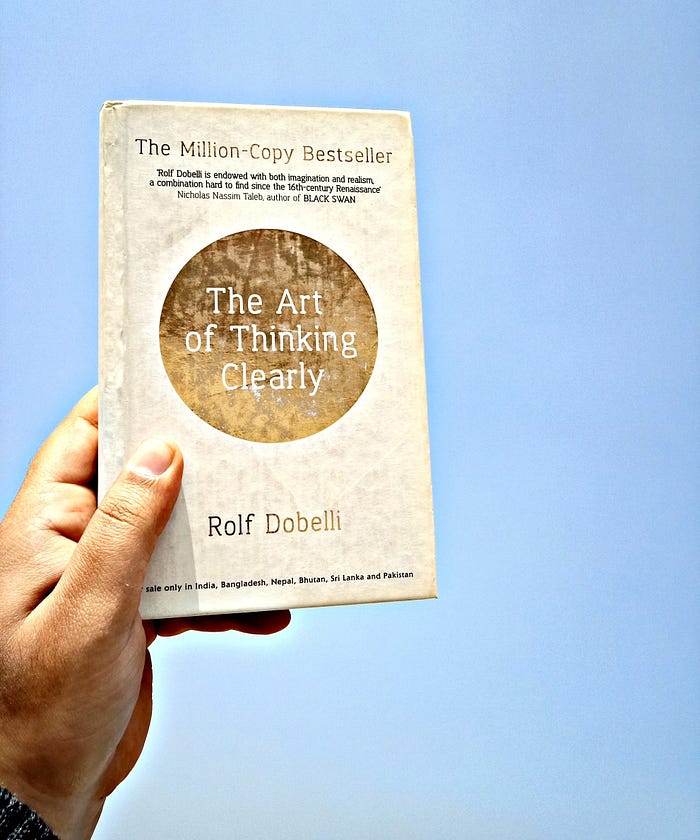
Introduction:
We are self-proclaimed great thinkers. But as much as we hate to admit it, the opposite is true. We are irrational beings driven by emotions rather than logic. Every day we make irrational decisions & most of the time we are not even aware of it.
We like to believe that we have made a decision after considering all the facts, data, & different perspectives in mind. But is it so? Our minds are not evolved to process statistical data.
These are not occasional errors that we make, We make these cognitive errors in judgment on a regular basis. There are different questions floating in your head right now
How do we tackle them?
How should we avoid them?
How can we make better decisions?
Well, the first step is knowing these systematic cognitive errors that we’ve been making for centuries.
Key Insights:
- This book contains 99 short chapters each of 2–3 pages covering each cognitive bias and logical fallacy with relevant examples, this book will keep you engaged as you’ll be able to relate to every other chapter as you yourself commit these errors on a regular basis.
- You’ll also find techniques to tackle these to improve your decision-making skills be it in investing, marketing, persuading, negotiation, or any other areas of your personal or professional life.
Final Thoughts:
Pick this up to improve your decision-making skills, start your journey of becoming a clear thinker, and change your life by making world-class decisions without blind spots.
5. Predictably Irrational by Dan Ariely
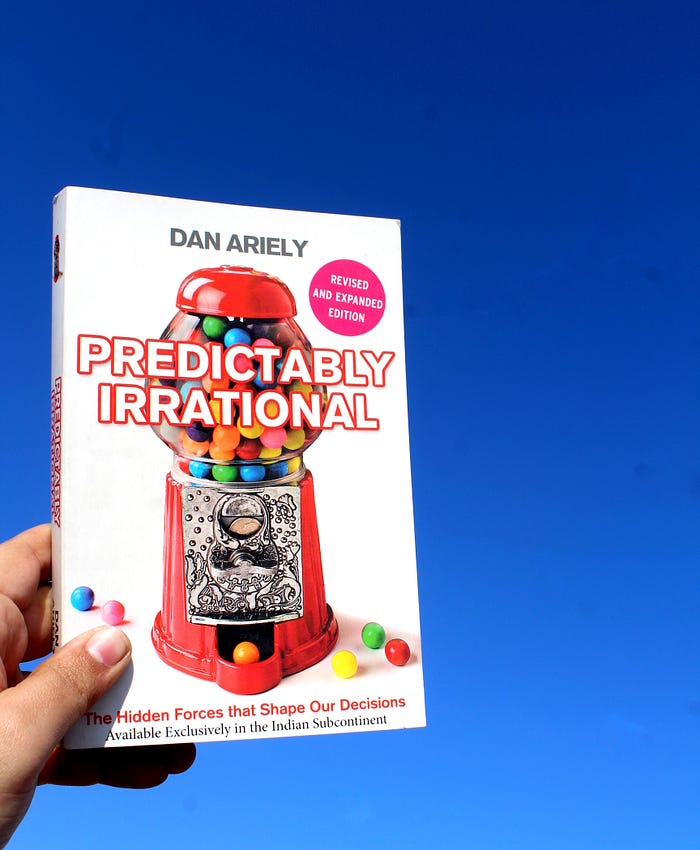
Introduction:
When it comes to making decisions in our lives we like to believe that we make decisions by thinking through all the options, perspectives & data we also like to believe that we take smart & rational decisions.
But is it really true? Or are we just overestimating our knowledge? Or
Are we just underestimating our stupidity?
We are self-proclaimed great thinkers of the world, after all, we’ve been able to build so much through our intellect & our so-called smart decision-making.
But as much as we hate to admit it the opposite is true.
In truth, we are irrational beings driven by emotions & feelings rather than logic, And this behavior is neither random nor senseless but is systematic & predictable. And that is why we are PREDICTABLY IRRATIONAL.
We all make the same mistakes over & over because of the wiring of our brain and we are not even aware of it.
️This book through its wonderful storytelling & several experiments sheds light on these mistakes & also puts forward a solution to help you overcome them.
Key Insights:
Why do we get attracted to FREE? Why is it so alluring? Why we are unable to comprehend the actual cost of “FREE”?
You’ll learn about market norms & social norms, and also the difference between them.
How does sexual energy influence our decision-making? and why you should not make bolder promises when you are happy?
How honest are we? Are we honest to a point where it is convenient for us?
The effect of expectations on our final opinions, why do we tend to like the things that we were expecting to like?
Why do expensive medicines help us cure instantly? Even when it is almost the same as inexpensive medicines? Does the price change our judgment?
𝐅𝐢𝐧𝐚𝐥 𝐨𝐩𝐢𝐧𝐢𝐨𝐧:
Readers who are interested in reading brain psychology and trying to form better decision-making skills and all of those who are interested in reading a brilliant book on cognitive biases with wonderful storytelling should pick this one.
That’s it from my side. Share these books with readers who are interested in learning about human behavior.
I appreciate you taking the time to read this article and paying attention to it.
